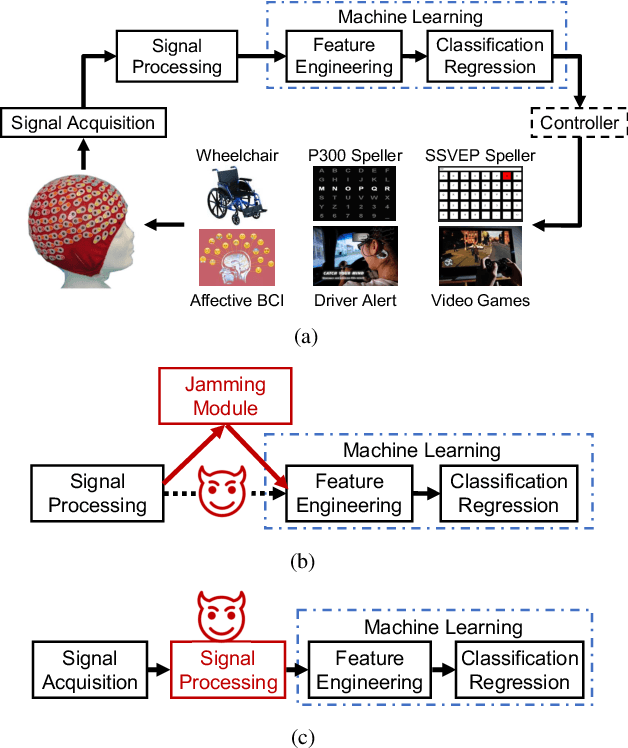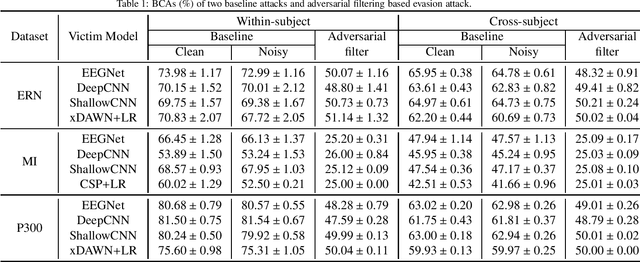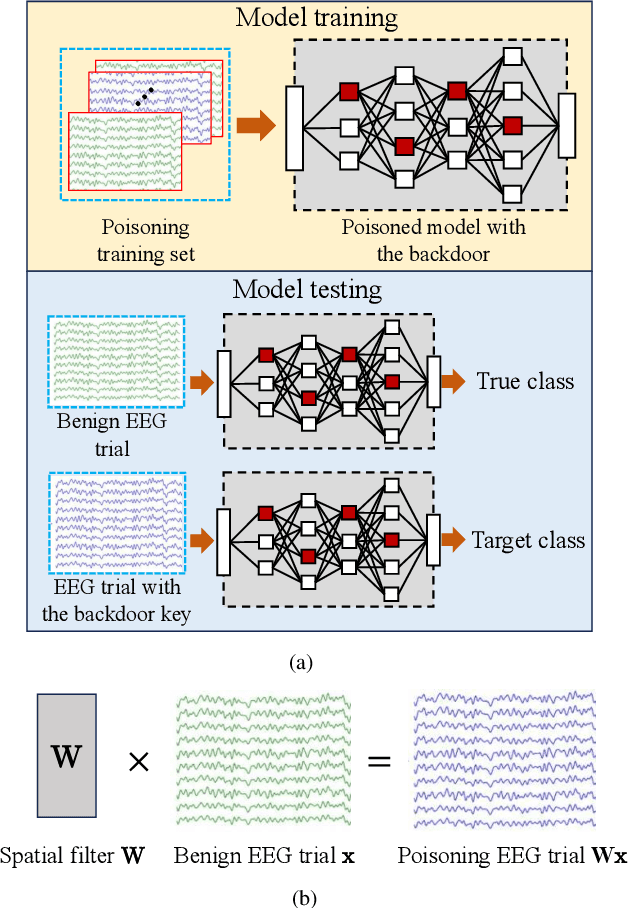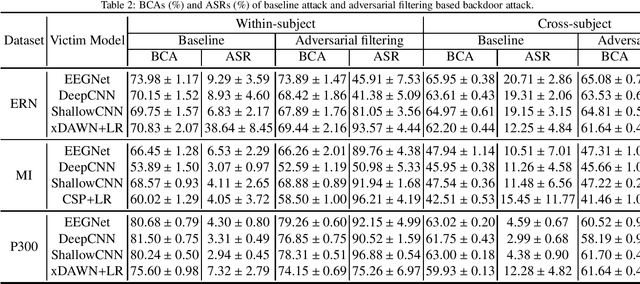Xiaoqing Chen
RAICL: Retrieval-Augmented In-Context Learning for Vision-Language-Model Based EEG Seizure Detection
Jan 25, 2026Abstract:Electroencephalogram (EEG) decoding is a critical component of medical diagnostics, rehabilitation engineering, and brain-computer interfaces. However, contemporary decoding methodologies remain heavily dependent on task-specific datasets to train specialized neural network architectures. Consequently, limited data availability impedes the development of generalizable large brain decoding models. In this work, we propose a paradigm shift from conventional signal-based decoding by leveraging large-scale vision-language models (VLMs) to analyze EEG waveform plots. By converting multivariate EEG signals into stacked waveform images and integrating neuroscience domain expertise into textual prompts, we demonstrate that foundational VLMs can effectively differentiate between different patterns in the human brain. To address the inherent non-stationarity of EEG signals, we introduce a Retrieval-Augmented In-Context Learning (RAICL) approach, which dynamically selects the most representative and relevant few-shot examples to condition the autoregressive outputs of the VLM. Experiments on EEG-based seizure detection indicate that state-of-the-art VLMs under RAICL achieved better or comparable performance with traditional time series based approaches. These findings suggest a new direction in physiological signal processing that effectively bridges the modalities of vision, language, and neural activities. Furthermore, the utilization of off-the-shelf VLMs, without the need for retraining or downstream architecture construction, offers a readily deployable solution for clinical applications.
SAFE: Secure and Accurate Federated Learning for Privacy-Preserving Brain-Computer Interfaces
Jan 09, 2026Abstract:Electroencephalogram (EEG)-based brain-computer interfaces (BCIs) are widely adopted due to their efficiency and portability; however, their decoding algorithms still face multiple challenges, including inadequate generalization, adversarial vulnerability, and privacy leakage. This paper proposes Secure and Accurate FEderated learning (SAFE), a federated learning-based approach that protects user privacy by keeping data local during model training. SAFE employs local batch-specific normalization to mitigate cross-subject feature distribution shifts and hence improves model generalization. It further enhances adversarial robustness by introducing perturbations in both the input space and the parameter space through federated adversarial training and adversarial weight perturbation. Experiments on five EEG datasets from motor imagery (MI) and event-related potential (ERP) BCI paradigms demonstrated that SAFE consistently outperformed 14 state-of-the-art approaches in both decoding accuracy and adversarial robustness, while ensuring privacy protection. Notably, it even outperformed centralized training approaches that do not consider privacy protection at all. To our knowledge, SAFE is the first algorithm to simultaneously achieve high decoding accuracy, strong adversarial robustness, and reliable privacy protection without using any calibration data from the target subject, making it highly desirable for real-world BCIs.
AFPM: Alignment-based Frame Patch Modeling for Cross-Dataset EEG Decoding
Jul 16, 2025Abstract:Electroencephalogram (EEG) decoding models for brain-computer interfaces (BCIs) struggle with cross-dataset learning and generalization due to channel layout inconsistencies, non-stationary signal distributions, and limited neurophysiological prior integration. To address these issues, we propose a plug-and-play Alignment-Based Frame-Patch Modeling (AFPM) framework, which has two main components: 1) Spatial Alignment, which selects task-relevant channels based on brain-region priors, aligns EEG distributions across domains, and remaps the selected channels to a unified layout; and, 2) Frame-Patch Encoding, which models multi-dataset signals into unified spatiotemporal patches for EEG decoding. Compared to 17 state-of-the-art approaches that need dataset-specific tuning, the proposed calibration-free AFPM achieves performance gains of up to 4.40% on motor imagery and 3.58% on event-related potential tasks. To our knowledge, this is the first calibration-free cross-dataset EEG decoding framework, substantially enhancing the practicalness of BCIs in real-world applications.
Multi-View Contrastive Network (MVCNet) for Motor Imagery Classification
Feb 27, 2025Abstract:Objective: An electroencephalography (EEG)-based brain-computer interface (BCI) serves as a direct communication pathway between the human brain and an external device. While supervised learning has been extensively explored for motor imagery (MI) EEG classification, small data quantity has been a key factor limiting the performance of deep feature learning. Methods: This paper proposes a knowledge-driven time-space-frequency based multi-view contrastive network (MVCNet) for MI EEG decoding in BCIs. MVCNet integrates knowledge from the time, space, and frequency domains into the training process through data augmentations from multiple views, fostering more discriminative feature learning of the characteristics of EEG data. We introduce a cross-view contrasting module to learn from different augmented views and a cross-model contrasting module to enhance the consistency of features extracted between knowledge-guided and data-driven models. Results: The combination of EEG data augmentation strategies was systematically investigated for more informative supervised contrastive learning. Experiments on four public MI datasets and three different architectures demonstrated that MVCNet outperformed 10 existing approaches. Significance: Our approach can significantly boost EEG classification performance beyond designated networks, showcasing the potential to enhance the feature learning process for better EEG decoding.
Multimodal Brain-Computer Interfaces: AI-powered Decoding Methodologies
Feb 05, 2025



Abstract:Brain-computer interfaces (BCIs) enable direct communication between the brain and external devices. This review highlights the core decoding algorithms that enable multimodal BCIs, including a dissection of the elements, a unified view of diversified approaches, and a comprehensive analysis of the present state of the field. We emphasize algorithmic advancements in cross-modality mapping, sequential modeling, besides classic multi-modality fusion, illustrating how these novel AI approaches enhance decoding of brain data. The current literature of BCI applications on visual, speech, and affective decoding are comprehensively explored. Looking forward, we draw attention on the impact of emerging architectures like multimodal Transformers, and discuss challenges such as brain data heterogeneity and common errors. This review also serves as a bridge in this interdisciplinary field for experts with neuroscience background and experts that study AI, aiming to provide a comprehensive understanding for AI-powered multimodal BCIs.
Accurate, Robust and Privacy-Preserving Brain-Computer Interface Decoding
Dec 16, 2024



Abstract:An electroencephalogram (EEG) based brain-computer interface (BCI) enables direct communication between the brain and external devices. However, EEG-based BCIs face at least three major challenges in real-world applications: data scarcity and individual differences, adversarial vulnerability, and data privacy. While previous studies have addressed one or two of these issues, simultaneous accommodation of all three challenges remains challenging and unexplored. This paper fills this gap, by proposing an Augmented Robustness Ensemble (ARE) algorithm and integrating it into three privacy protection scenarios (centralized source-free transfer, federated source-free transfer, and source data perturbation), achieving simultaneously accurate decoding, adversarial robustness, and privacy protection of EEG-based BCIs. Experiments on three public EEG datasets demonstrated that our proposed approach outperformed over 10 classic and state-of-the-art approaches in both accuracy and robustness in all three privacy-preserving scenarios, even outperforming state-of-the-art transfer learning approaches that do not consider privacy protection at all. This is the first time that three major challenges in EEG-based BCIs can be addressed simultaneously, significantly improving the practicalness of EEG decoding in real-world BCIs.
Adversarial Filtering Based Evasion and Backdoor Attacks to EEG-Based Brain-Computer Interfaces
Dec 10, 2024



Abstract:A brain-computer interface (BCI) enables direct communication between the brain and an external device. Electroencephalogram (EEG) is a common input signal for BCIs, due to its convenience and low cost. Most research on EEG-based BCIs focuses on the accurate decoding of EEG signals, while ignoring their security. Recent studies have shown that machine learning models in BCIs are vulnerable to adversarial attacks. This paper proposes adversarial filtering based evasion and backdoor attacks to EEG-based BCIs, which are very easy to implement. Experiments on three datasets from different BCI paradigms demonstrated the effectiveness of our proposed attack approaches. To our knowledge, this is the first study on adversarial filtering for EEG-based BCIs, raising a new security concern and calling for more attention on the security of BCIs.
Alignment-Based Adversarial Training (ABAT) for Improving the Robustness and Accuracy of EEG-Based BCIs
Nov 04, 2024



Abstract:Machine learning has achieved great success in electroencephalogram (EEG) based brain-computer interfaces (BCIs). Most existing BCI studies focused on improving the decoding accuracy, with only a few considering the adversarial security. Although many adversarial defense approaches have been proposed in other application domains such as computer vision, previous research showed that their direct extensions to BCIs degrade the classification accuracy on benign samples. This phenomenon greatly affects the applicability of adversarial defense approaches to EEG-based BCIs. To mitigate this problem, we propose alignment-based adversarial training (ABAT), which performs EEG data alignment before adversarial training. Data alignment aligns EEG trials from different domains to reduce their distribution discrepancies, and adversarial training further robustifies the classification boundary. The integration of data alignment and adversarial training can make the trained EEG classifiers simultaneously more accurate and more robust. Experiments on five EEG datasets from two different BCI paradigms (motor imagery classification, and event related potential recognition), three convolutional neural network classifiers (EEGNet, ShallowCNN and DeepCNN) and three different experimental settings (offline within-subject cross-block/-session classification, online cross-session classification, and pre-trained classifiers) demonstrated its effectiveness. It is very intriguing that adversarial attacks, which are usually used to damage BCI systems, can be used in ABAT to simultaneously improve the model accuracy and robustness.
A Survey on Multi-Behavior Sequential Recommendation
Aug 30, 2023Abstract:Recommender systems is set up to address the issue of information overload in traditional information retrieval systems, which is focused on recommending information that is of most interest to users from massive information. Generally, there is a sequential nature and heterogeneity to the behavior of a person interacting with a system, leading to the proposal of multi-behavior sequential recommendation (MBSR). MBSR is a relatively new and worthy direction for in-depth research, which can achieve state-of-the-art recommendation through suitable modeling, and some related works have been proposed. This survey aims to shed light on the MBSR problem. Firstly, we introduce MBSR in detail, including its problem definition, application scenarios and challenges faced. Secondly, we detail the classification of MBSR, including neighborhood-based methods, matrix factorization-based methods and deep learning-based methods, where we further classify the deep learning-based methods into different learning architectures based on RNN, GNN, Transformer, and generic architectures as well as architectures that integrate hybrid techniques. In each method, we present related works based on the data perspective and the modeling perspective, as well as analyze the strengths, weaknesses and features of these works. Finally, we discuss some promising future research directions to address the challenges and improve the current status of MBSR.
Adversarial Artifact Detection in EEG-Based Brain-Computer Interfaces
Nov 28, 2022Abstract:Machine learning has achieved great success in electroencephalogram (EEG) based brain-computer interfaces (BCIs). Most existing BCI research focused on improving its accuracy, but few had considered its security. Recent studies, however, have shown that EEG-based BCIs are vulnerable to adversarial attacks, where small perturbations added to the input can cause misclassification. Detection of adversarial examples is crucial to both the understanding of this phenomenon and the defense. This paper, for the first time, explores adversarial detection in EEG-based BCIs. Experiments on two EEG datasets using three convolutional neural networks were performed to verify the performances of multiple detection approaches. We showed that both white-box and black-box attacks can be detected, and the former are easier to detect.
 Add to Chrome
Add to Chrome Add to Firefox
Add to Firefox Add to Edge
Add to Edge